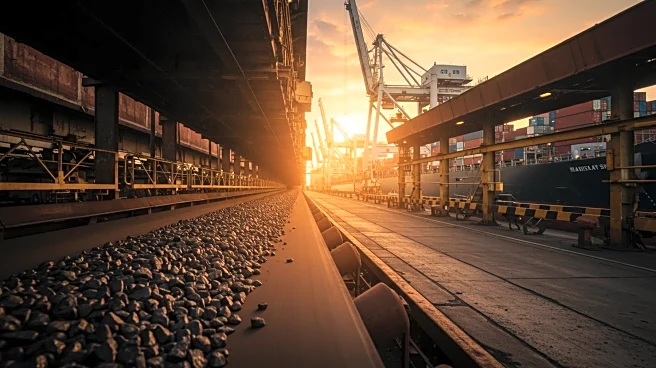What is the story about?
What's Happening?
Brazil is experiencing a rise in iron ore shipments to China, with a 4% year-on-year increase expected between January and August 2025. This growth is attributed to stronger mining activity in Brazil, which is the world's second-largest exporter of iron ore. Brazilian shipments are replacing those from Australia, Peru, and India, which have faced various disruptions. Australia has been affected by severe weather, Peru by port handling issues, and India by price competition and increased domestic demand. Despite a drop in Chinese steel production, Brazil's iron ore exports have continued to grow, benefiting from longer sailing distances that increase tonne mile demand.
Why It's Important?
The increase in Brazilian iron ore shipments to China is significant as it impacts global supply chain dynamics. Brazil's ability to maintain and grow its export levels amid disruptions in other countries highlights its strategic importance in the global iron ore market. This shift may affect global iron ore prices and trade patterns, influencing industries reliant on steel production. The longer sailing distances for Brazilian shipments also contribute to increased demand for shipping services, potentially benefiting the maritime industry. However, the ongoing property sector crisis in China and declining steel demand pose challenges to sustaining this growth.
What's Next?
Looking ahead, the start of operations at the Simandou mine in Guinea is expected to boost global iron ore supply and further increase sailing distances, potentially pressuring iron ore prices. This development may encourage China to rely more on imports rather than domestic mining. Stakeholders in the shipping and mining industries will likely monitor these changes closely, as they could impact trade flows and pricing strategies. Additionally, the continued decline in Chinese steel demand may necessitate adjustments in export strategies for countries like Brazil.
Beyond the Headlines
The shift in iron ore trade patterns may have broader implications for global economic relations, particularly between Brazil and China. As Brazil strengthens its position as a key supplier to China, it may gain leverage in trade negotiations and influence over global commodity markets. This development also underscores the importance of diversifying supply sources to mitigate risks associated with regional disruptions.















